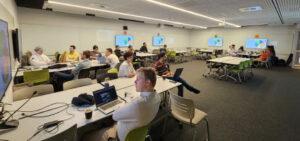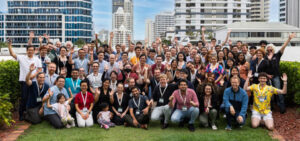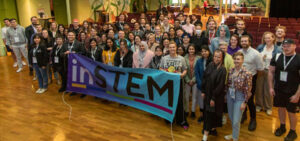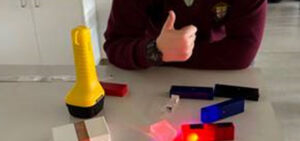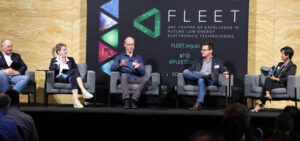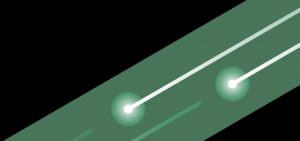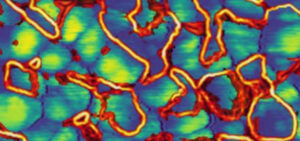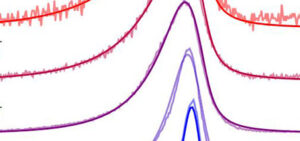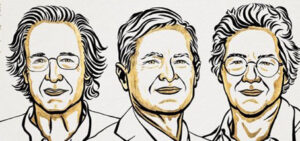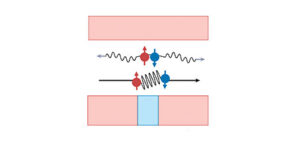Collaborate
Subscription confirmed
 WELCOME TO FLEET NEWS with regular updates from the Australian Research Council Centre of Excellence in Future Low-Energy Electronics Technologies.
WELCOME TO FLEET NEWS with regular updates from the Australian Research Council Centre of Excellence in Future Low-Energy Electronics Technologies.
Each edition of FLEET News brings a selection of research news from around the Centre, a wrap-up of FLEET stories in the media, outreach, and other news regarding FLEET researchers and research.
Catch up on past issues of FLEET News.
Michael Fuhrer
Director, FLEET
ARC Centre of Excellence in Future Low-Energy Electronics Technologies
Following the news
 If you’re on Facebook, Twitter or Linkedin, you can follow our accounts to stay up to date with FLEET news and events. You can also follow news and events at FLEET.org.au.
If you’re on Facebook, Twitter or Linkedin, you can follow our accounts to stay up to date with FLEET news and events. You can also follow news and events at FLEET.org.au.
If a friend or colleague might be interested in our news, send them this link. Or let us know and we’ll invite them.
The challenge
 The big challenge that FLEET is addressing is the increasing energy load of computation, which is currently at least 5% of world electricity use, and doubling each decade.
The big challenge that FLEET is addressing is the increasing energy load of computation, which is currently at least 5% of world electricity use, and doubling each decade.
To date, the amount of energy being burned by computing has been kept in check by a phenomenon known as Moore’s Law, whereby the number of chips in a given area doubles every two years. But we are fast approaching a limit for Moore’s Law.
Current computing is based on semiconductor chips that each burn a tiny, tiny amount of power as they ‘switch’. FLEET will develop switches that will burn almost zero energy, operating at room temperature.
Our research
FLEET will use new concepts for electronic conduction without resistance to create a new generation of ultra-low energy electronics.
We will develop materials in which electricity can flow with minimal resistance and dissipation of heat, and devices in which that electric current can be switched on and off.
FLEET’s three Research Themes are:
- Topological materials (led by Alex Hamilton, UNSW)
- Exciton superfluids (Elena Ostrovskaya, ANU)
- Light-transformed materials (Kris Helmerson, Monash)
And this research is underpinned by two Technology themes:
- Fabrication of atomically thin materials (Xiaolin Wang, University of Wollongong)
- Nanodevice fabrication (Lan Wang, RMIT)
About FLEET

With over $40M investment from the ARC (Australian Research Council) and contributing organisations, FLEET will make a significant global impact in the electronics and energy sectors.
Headquartered at Monash University, and an ARC Centre of Excellence, FLEET has 19 chief investigators at seven Australian institutions, 17 partner investigators at 13 institutions worldwide, and will have over 100 higher-degree research students and postdoctoral fellows.
The highly interdisciplinary team includes some of Australia’s best researchers in atomic physics, condensed matter physics, materials science, electronics, nanofabrication and atomically thin materials.
By building strategic and strong partnerships with Australian and international industry, research institutions and government, FLEET will build capacity for advanced electronics research in Australia and train the workforce for the next generation of electronic materials researchers and future semiconductor industry.
Recent news
Oliver Paull was one of the original cohort of FLEET PhD students when the Centre was launched in 2017. We interviewed Oliver about his career path after leaving FLEET (Oliver completed his PhD in July 2022), and how he has used his technical and collaboration training at FLEET in his new position as a postdoc at Unité Mixte de Physique, …
The FLEET Students and ECRs working group organised a workshop at UNSW on the 19th and 20th of October for FLEET early career researchers (ECRs) and students. Over two days, invited speakers shared lessons and experience on diverse skills essential for a researcher’s career development, such as profile building, science communication, mental health, and academic writing. On the first morning, …
FLEET members gathered in Surfer’s Paradise Queensland recently for the Centre’s final meeting. The FLEET Legacy Workshop celebrated seven years of transformative innovation, capacity building, and future STEM leaders development. Presentations by Governance Chairs, Centre leaders and early-career researchers covered research highlights across the Centre, as well as innovations in STEM equity, skills development, and outreach. Some impressive stats over …
The second inSTEM conference took place in Melbourne, 19–21 September 2023, at RMIT’s iconic Storey Hall. (Story by EQUS Communications & Engagement Manager, Dr Kristen Harley) inSTEM is a networking and career development conference for people from marginalised or underrepresented groups in STEM, and their allies. Originally developed by ARC Centre of Excellence for Engineered Quantum Systems (EQUS)’ EQUIP committee, …
This month’s ARC infrastructure funding round saw FLEET researchers across five universities on teams awarded additional funding towards research facilities, including significant new imaging resources in South Australia and NSW. Pankaj Sharma, initially a FLEET Research Fellow at UNSW and now a Centre AI at Flinders University (South Australia), will help develop new, state-of-the-art atomic force microscopy (AFM) facilities for the …
The FLEET-EU 2023 Conference : Transport in exciton condensates and exciton insulators took place on September 11, 2023 in San Benedetto del Tronto, the art-deco resort town known as the Riviera of the Palms situated on the Italian Adriatic coast. The conference was jointly organised by University of Camerino (Italy), University of Antwerp (Belgium), and FLEET, and covered a range …
FLEET took a road trip to Horsham in regional Victoria to introduce 100 Year 8 and 9 students to quantum physics and the colourful world of light. Year 8 students participated in range of hands-on activities such as the famous ‘Pepper’s Ghost’ visual illusion, and playing with lasers and prisms to understand reflection and refraction. Meanwhile Year 9 students took …
An audience of around 90 gathered for the Meet FLEET event at UNSW earlier this month, comprising researchers, industry representatives and others. A major aim of the event was to serve as a bridge, fostering connections while providing industry professionals and researchers the opportunity to delve into collaborative research and development programs. Meet FLEET also showcased the Centre’s research capabilities …
This month’s ARC Discovery Project announcement saw FLEET research and researchers awarded additional research funding for ten projects building fundamental knowledge and strengthening Australia’s quantum, photonics and nanotechnology ecosystems. See the Australian Research Council media release. Dimitrie Culcer (UNSW); Allan MacDonald. Filling a substantial knowledge gap in novel semiconductors that can function as sensors in a frequency range where conventional …
Congratulations to Prof Yuerui Larry Lu (ANU), receiving the 2023 Malcolm McIntosh Prize for Physical Scientist of the Year—recognising his work in interlayer exciton pairs, paving the way for faster, more energy-efficient future electronics. Professor Lu was recognised for discovering interlayer exciton pairs, which can help to unravel the phenomenon of superfluidity. This discovery is paving the way for new …
Published first at Flinders University Latest research from Flinders University and UNSW Sydney, published in the American Chemical Society ACS Nano journal, explores switchable polarization in a new class of silicon compatible metal oxides and paves the way for the development of advanced devices including high-density data storage, ultra low energy electronics, and flexible energy harvesting and wearable devices. The …
Researchers from Monash University have unlocked fresh insights into the behaviour of quantum impurities within materials. The new, international theoretical study introduces a novel approach known as the ‘quantum virial expansion,’ offering a powerful tool to uncover the complex quantum interactions in two-dimensional semiconductors. This breakthrough holds potential to reshape our understanding of complex quantum systems and unlock exciting future …
Congratulations Prof Ferenc Krausz (MPQ) awarded the Nobel Prize in Physics today for his work in attosecond physics. Prof Krausz is the Director of the Max Planck Institute of Quantum Optics (MPQ). As a FLEET Partner Investigator, along with CI A/Prof. Agustin Schiffrin (Monash) and AI Nick Karpowicz (MPQ), Prof Krausz is involved in FLEET’s Research Theme 3, using ultrashort waveform-controlled laser …
A collaboration of FLEET researchers from the University of Wollongong and Monash University have reviewed the superconducting diode effect, one of the most fascinating phenomena recently discovered in quantum condensed-matter physics. A superconducting diode enables dissipationless supercurrent to flow in only one direction, and provides new functionalities for superconducting circuits. This non-dissipative circuit element is key to future ultra-low energy …
The public’s awe of FLEET’s levitating superconductor and engaging dialogue with FLEET at the 2023 Sydney Science Trail enabled a shift in public understanding about how society uses digital technology and a call for a socially responsible digital future. FLEET was one of more than 20 science organisations engaging audiences with interactive exhibits at the Sydney Science Trail Expo, developed …


